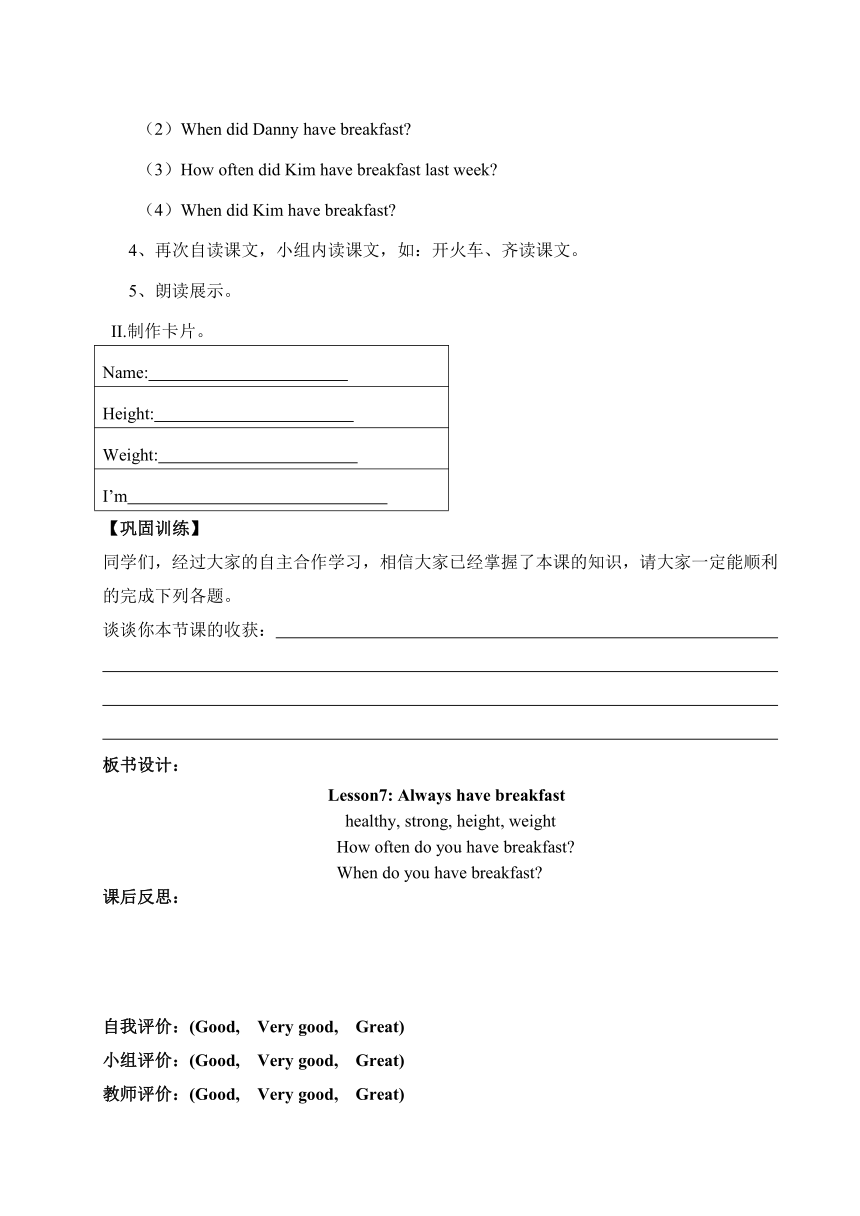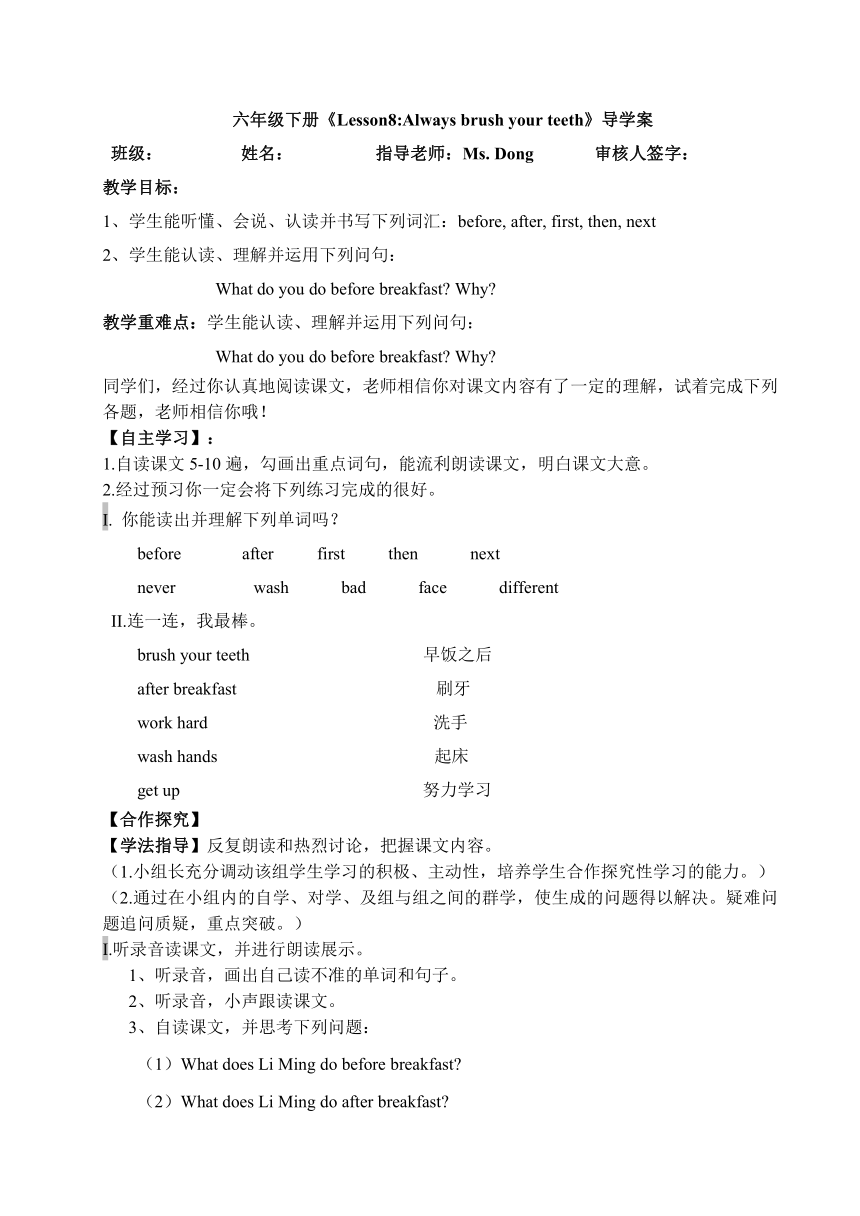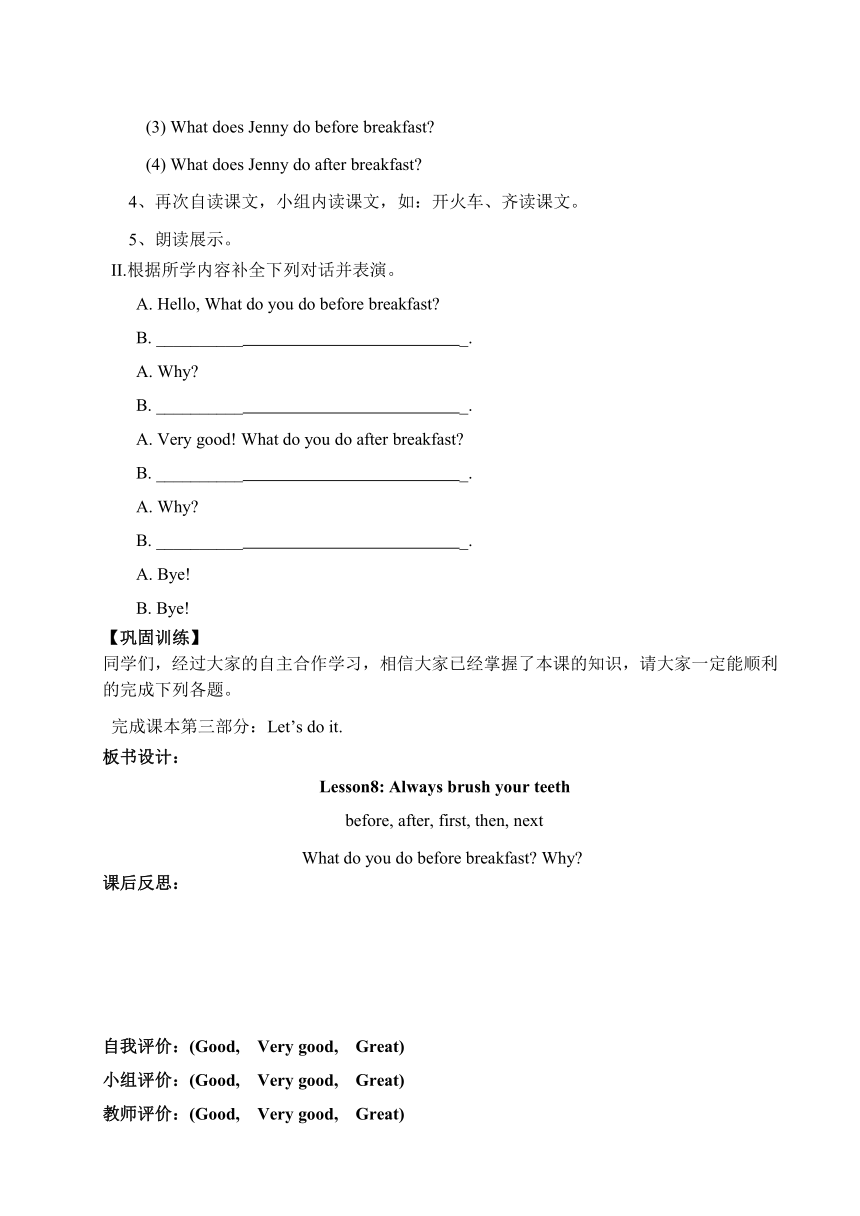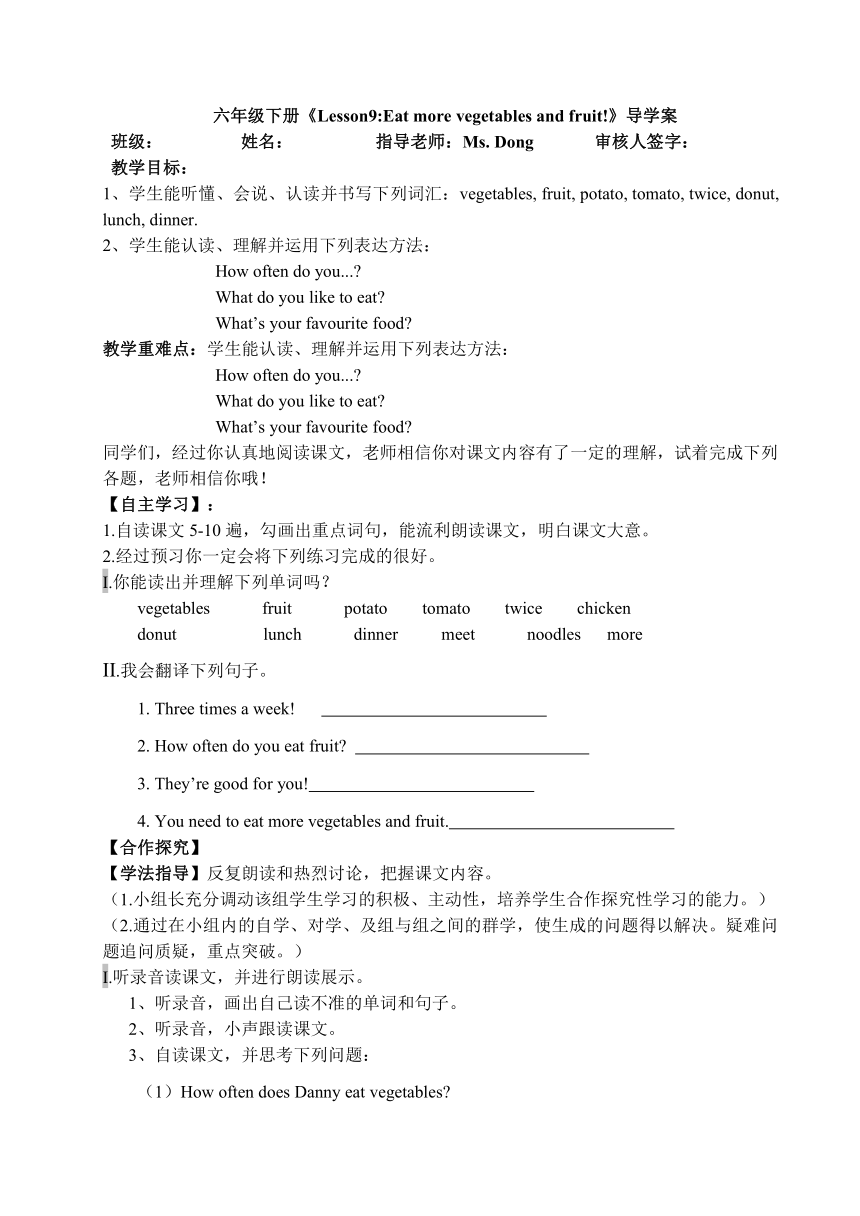冀教版(三年级起点) 六年级下册 Unit 2 Good Health to You! 单元教学案(6课时)
文档属性
| 名称 | 冀教版(三年级起点) 六年级下册 Unit 2 Good Health to You! 单元教学案(6课时) |  | |
| 格式 | zip | ||
| 文件大小 | 23.4KB | ||
| 资源类型 | 教案 | ||
| 版本资源 | 冀教版(三年级起点) | ||
| 科目 | 英语 | ||
| 更新时间 | 2016-07-03 11:56:18 | ||
图片预览





文档简介
六年级下册《Lesson7:
Always
have
breakfast》导学案
班级:
姓名:
指导老师:Ms.
Dong
审核人签字:
教学目标:1、学生能听懂、会说、认读并书写下列词汇:healthy,
strong,
height,
weight.
2、学生能认读、理解并运用下列问句:
How
often
do
you
have
breakfast
When
do
you
have
breakfast
教学重难点:学生能认读、理解并运用下列问句:
How
often
do
you
have
breakfast
When
do
you
have
breakfast
同学们,经过你认真地阅读课文,老师相信你对课文内容有了一定的理解,试着完成下列各题,老师相信你哦!
【自主学习】:
1.自读课文5-10遍,勾画出重点词句,能流利朗读课文,明白课文大意。
2.经过预习你一定会将下列练习完成的很好。
I.你能读出并理解下列单词吗?
healthy
strong
height
weight
should
always
once
last
week
breakfast
about
be
II.连一连,我最棒。
last
week
六次
six
times
吃水果
have
breakfast
上周
eat
fruit
做运动
play
sports
吃早饭
【合作探究】
【学法指导】反复朗读和热烈讨论,把握课文内容。
(1.小组长充分调动该组学生学习的积极、主动性,培养学生合作探究性学习的能力。)
(2.通过在小组内的自学、对学、及组与组之间的群学,使生成的问题得以解决。疑难问题追问质疑,重点突破。)
I.听录音读课文,并进行朗读展示。
1、听录音,画出自己读不准的单词和句子。
2、听录音,小声跟读课文。
3、自读课文,并思考下列问题:
(1)How
often
did
Danny
have
breakfast
last
week
(2)When
did
Danny
have
breakfast
(3)How
often
did
Kim
have
breakfast
last
week
(4)When
did
Kim
have
breakfast
4、再次自读课文,小组内读课文,如:开火车、齐读课文。
5、朗读展示。
II.制作卡片。
Name:
Height:
Weight:
I’m
【巩固训练】
同学们,经过大家的自主合作学习,相信大家已经掌握了本课的知识,请大家一定能顺利的完成下列各题。
谈谈你本节课的收获:
板书设计:
Lesson7:
Always
have
breakfast
healthy,
strong,
height,
weight
How
often
do
you
have
breakfast
When
do
you
have
breakfast
课后反思:
自我评价:(Good,
Very
good,
Great)
小组评价:(Good,
Very
good,
Great)
教师评价:(Good,
Very
good,
Great)
六年级下册《Lesson8:Always
brush
your
teeth》导学案
班级:
姓名:
指导老师:Ms.
Dong
审核人签字:
教学目标:
1、学生能听懂、会说、认读并书写下列词汇:before,
after,
first,
then,
next
2、学生能认读、理解并运用下列问句:
What
do
you
do
before
breakfast
Why
教学重难点:学生能认读、理解并运用下列问句:
What
do
you
do
before
breakfast
Why
同学们,经过你认真地阅读课文,老师相信你对课文内容有了一定的理解,试着完成下列各题,老师相信你哦!
【自主学习】:
1.自读课文5-10遍,勾画出重点词句,能流利朗读课文,明白课文大意。
2.经过预习你一定会将下列练习完成的很好。
I.
你能读出并理解下列单词吗?
before
after
first
then
next
never
wash
bad
face
different
II.连一连,我最棒。
brush
your
teeth
早饭之后
after
breakfast
刷牙
work
hard
洗手
wash
hands
起床
get
up
努力学习
【合作探究】
【学法指导】反复朗读和热烈讨论,把握课文内容。
(1.小组长充分调动该组学生学习的积极、主动性,培养学生合作探究性学习的能力。)
(2.通过在小组内的自学、对学、及组与组之间的群学,使生成的问题得以解决。疑难问题追问质疑,重点突破。)
I.听录音读课文,并进行朗读展示。
1、听录音,画出自己读不准的单词和句子。
2、听录音,小声跟读课文。
3、自读课文,并思考下列问题:
(1)What
does
Li
Ming
do
before
breakfast
(2)What
does
Li
Ming
do
after
breakfast
(3)
What
does
Jenny
do
before
breakfast
(4)
What
does
Jenny
do
after
breakfast
4、再次自读课文,小组内读课文,如:开火车、齐读课文。
5、朗读展示。
II.根据所学内容补全下列对话并表演。
A.
Hello,
What
do
you
do
before
breakfast
B.
__________
_.
A.
Why
B.
__________
_.
A.
Very
good!
What
do
you
do
after
breakfast
B.
__________
_.
A.
Why
B.
__________
_.
A.
Bye!
B.
Bye!
【巩固训练】
同学们,经过大家的自主合作学习,相信大家已经掌握了本课的知识,请大家一定能顺利的完成下列各题。
完成课本第三部分:Let’s
do
it.
板书设计:
Lesson8:
Always
brush
your
teeth
before,
after,
first,
then,
next
What
do
you
do
before
breakfast
Why
课后反思:
自我评价:(Good,
Very
good,
Great)
小组评价:(Good,
Very
good,
Great)
教师评价:(Good,
Very
good,
Great)
六年级下册《Lesson9:Eat
more
vegetables
and
fruit!》导学案
班级:
姓名:
指导老师:Ms.
Dong
审核人签字:
教学目标:
1、学生能听懂、会说、认读并书写下列词
( http: / / www.21cnjy.com )汇:vegetables,
fruit,
potato,
tomato,
twice,
donut,
lunch,
dinner.
2、学生能认读、理解并运用下列表达方法:
How
often
do
you...
What
do
you
like
to
eat
What’s
your
favourite
food
教学重难点:学生能认读、理解并运用下列表达方法:
How
often
do
you...
What
do
you
like
to
eat
What’s
your
favourite
food
同学们,经过你认真地阅读课文,老师相信你对课文内容有了一定的理解,试着完成下列各题,老师相信你哦!
【自主学习】:
1.自读课文5-10遍,勾画出重点词句,能流利朗读课文,明白课文大意。
2.经过预习你一定会将下列练习完成的很好。
I.你能读出并理解下列单词吗?
vegetables
fruit
potato
tomato
twice
chicken
donut
lunch
dinner
meet
noodles
more
II.我会翻译下列句子。
1.
Three
times
a
week!
2.
How
often
do
you
eat
fruit
3.
They’re
good
for
you!
4.
You
need
t
( http: / / www.21cnjy.com )o
eat
more
vegetables
and
fruit.
【合作探究】
【学法指导】反复朗读和热烈讨论,把握课文内容。
(1.小组长充分调动该组学生学习的积极、主动性,培养学生合作探究性学习的能力。)
(2.通过在小组内的自学、对学、及组与组之间的群学,使生成的问题得以解决。疑难问题追问质疑,重点突破。)
I.听录音读课文,并进行朗读展示。
1、听录音,画出自己读不准的单词和句子。
2、听录音,小声跟读课文。
3、自读课文,并思考下列问题:
(1)How
often
does
Danny
eat
vegetables
(2)How
often
does
Danny
eat
fruit
(3)How
often
does
Danny
eat
donuts
4、再次自读课文,小组内读课文,如:开火车、齐读课文。
5、朗读展示。
II.完成课本第二部分:Let’s
do
it.
【巩固训练】
同学们,经过大家的自主合作学习,相信大家已经掌握了本课的知识,请大家一定能顺利的完成下列各题。
连词成句:
1.
I
to
vegetables
more
eat
need
(.)
2.
often
you
how
eat
noodles
do
( )
3.
good
they
for
are
you
(.)
4.
rice
a
I
week
eat
twice
(.)
板书设计:
Lesson9:Eat
more
vegetables
and
fruit!
vegetables,
fruit,
potato,
tomato,
twice,
donut,
lunch,
dinner.
How
often
do
you...
What
do
you
like
to
eat
What’s
your
favourite
food
课后反思:
自我评价:(Good,
Very
good,
Great)
小组评价:(Good,
Very
good,
Great)
教师评价:(Good,
Very
good,
Great)
六年级下册《Lesson10:Exercise》导学案
班级:
姓名:
指导老师:Ms.
Dong
审核人签字:
教学目标:1、学生能听懂、会说、认读并书写下列词汇:
ride,
exercise,
walk,
minute,
hour,
watch.
2、学生能认读、理解并运用下列问句:
What
is
exercise
How
many
minutes
does
Danny
exercise
教学重难点:学生能认读、理解并运用下列问句:
What
is
exercise
How
many
minutes
does
Danny
exercise
同学们,经过你认真地阅读课文,老师相信你对课文内容有了一定的理解,试着完成下列各题,老师相信你哦!
【自主学习】:
1.自读课文5-10遍,勾画出重点词句,能流利朗读课文,明白课文大意。
2.经过预习你一定会将下列练习完成的很好。
I.
你能读出并理解下列单词吗?
ride
exercise
walk
minute
hour
walk
run
half
watch
II.连一连,我最棒。
ride
a
bike
打乒乓球
play
ping-pong
骑自行车
walk
to
school
步行回家
walk
home
一天两次
twice
a
day
步行去学校
【合作探究】
【学法指导】反复朗读和热烈讨论,把握课文内容。
(1.小组长充分调动该组学生学习的积极、主动性,培养学生合作探究性学习的能力。)
(2.通过在小组内的自学、对学、及组与组之间的群学,使生成的问题得以解决。疑难问题追问质疑,重点突破。)
I.
听录音读课文,并进行朗读展示。
1、听录音,画出自己读不准的单词和句子。
2、听录音,小声跟读课文。
3、自读课文,并思考下列问题:
(1)What
is
exercise
(2)How
many
minutes
does
Danny
exercise
4、再次自读课文,小组内读课文,如:开火车、齐读课文。
5、朗读展示。
II.完成课本第三部分:Let’s
do
it.
【巩固训练】
同学们,经过大家的自主合作学习,相信大家已经掌握了本课的知识,请大家一定能顺利的完成下列各题。
单项选择:
1.
Good
food
helps
______
you
healthy.
A.make
B.to
let
C.to
makes
2.
--How
many
______
are
there
in
an
hour
--Sixty.
A.minutes
B.days
C.hours
3.
I
can
______
sports
on
TV.
A.look
B.watch
C.see
4.
There
are
24
______
in
a
day.
A.how
B.hours
C.minutes
板书设计:
Lesson10:
Exercise
ride,
exercise,
walk,
minute,
hour,
watch.
What
is
exercise
How
many
minutes
does
Danny
exercise
课后反思:
自我评价:(Good,
Very
good,
Great)
小组评价:(Good,
Very
good,
Great)
教师评价:(Good,
Very
good,
Great)
六年级下册《Lesson11:
Work
hard》导学案
班级:
姓名:
指导老师:Ms.
Dong
审核人签字:
教学目标:
1、学生能听懂、会说、认读并书写下列词汇:important,
high,
low,
dry,
dish,
else,
bedroom.
2、学生能认读、理解并运用下列问句:Do
you
work
hard
教学重难点:
学生能认读、理解并运用下列问句:Do
you
work
hard
同学们,经过你认真地阅读课文,老师相信你对课文内容有了一定的理解,试着完成下列各题,老师相信你哦!
【自主学习】
【学法指导】:1.自读课文5—10遍,勾画出重点词句。自学练习册习题。
2.经过预习你一定会将下列练习完成的很好。
I.你能读出并理解下列单词吗?
Important
high
low
dry
dish
else
bedroom
on
time
II.翻译下列短语。
1.
work
hard
_______________
2.
make
lunch_______________
3.
Good
work!
_______________
4.
dry
the
dishes_______________
5.
clean
the
house
_______________
6.
a
high
tree
_______________
7.
water
the
f
( http: / / www.21cnjy.com )lower_______________
8.do
my
homework_______________
【合作探究】
【学法指导】反复朗读和热烈讨论,把握课文内容。
(1.小组长充分调动该组学生学习的积极、主动性,培养学生合作探究性学习的能力。)
(2.通过在小组内的自学、对学、及组与组之间的群学,使生成的问题得以解决。疑难问题追问质疑,重点突破。)
I.听录音读课文,并进行朗读展示。
1、听录音,画出自己读不准的单词和句子。
2、听录音,小声跟读课文。
3、自读课文,并思考下列问题:
(1)What
does
Jenny
do
at
school
(2)What
does
Jenny
do
at
sport
(3)
What
does
Jenny
do
at
home
(4)
What
does
Kim
do
at
home
(5)Did
Liming
and
Jenny
have
fun
Why
4、再次自读课文,小组内读课文,如:开火车、齐读课文。
5、朗读展示。
II.完成本课第三部分:Let’s
chant!.
1、听录音,理解意思。
2、听录音,小声跟唱课文。
3、带上动作边唱边表演。
【巩固训练】
同学们,经过大家的自主合作学习,相信大家已经掌握了本课的知识,请大家一定能顺利的完成下列各题。
根据汉语提示完成句子。
1.What
he
said
at
the
meeting
was__________(重要的)。
2.The
sun
is
_____(高的)in
the
sky。
3.She
put
it
down
on
the
__________(低的)table。
板书设计:
Lesson11:
Work
hard
important,
high,
low,
dry,
dish,
else,
bedroom.
Do
you
work
hard
课后反思:
自我评价:(Good,
Very
good,
Great)
小组评价:(Good,
Very
good,
Great)
教师评价:(Good,
Very
good,
Great)
六年级下册《Lesson12:Helen
Keller》导学案
班级:
姓名:
指导老师:Ms.
Dong
审核人签字:
教学目标:
1、学生要听并理解一个简单的故事。
2、学生要回答关于这个故事的问题。
同学们,经过你认真地阅读课文,老师相信你对课文内容有了一定的理解,试着完成下列各题,老师相信你哦!
【自主学习】
【学法指导】:1.自读课文5—10遍,勾画出重点词句。自学练习册习题。
2.经过预习你一定会将下列练习完成的很好。
I.
按要求完成各题。
health(形容词)
______ _____
2.after(反义词)
______ _____
3.
weak(反义词)
______ _____
4.time(复数)
______ _____
5.low(反义词)
______ _____
6.tooth(复数)
______ _____
Ⅱ英汉互译。
1.
be
good
for
______ _____
2.work
hard
______ _____
3.
wash
one’s
face______ _____
4.一周两次
______ _____
5.起床
______ _____
6.打扫房间
______ _____
Ⅲ.单项选择。
(
)1.I
always
get
up
______6:30______
the
morning.
A.
at,
at
B.
in,
in
C.
at,
in
(
)2.LiMing
often
__________to
school.
A.
walk
B.
walks
C.
walked
(
)3.I
often
play
chess
__________
my
grandpa.
A.
with
B.
and
C.
for
(
)4.How
many__________
are
there
on
the
table
A.
book
B.
a
book
C.
books
(
)5.We
should
eat
more
_________
food
A.
bad
B.
healthy
C.
strong
(
)6.We
often
do
__________
in
the
morning.
A.
exercise
B.
exercises
C.
exercise’s
(
)7.
---__________
do
you
drink
milk
---Every
day.
A.
How
many
B.
What
C.
How
often
(
)8.We
go
to
school________
Monday
______
Friday.
A.
to;to
B.
from;to
C.
to;from
【合作探究】
I.
给下列句子选择合适的答语。
(
)1.Are
you
strong
and
healthy
A.
Three
times
a
week.
(
)
2.Does
Danny
always
have
breakfast
B.
Yes,
I
am.
(
)
3.How
often
do
you
eat
chicken
C.I
brush
my
teeth.
(
)
4.What
do
you
( http: / / www.21cnjy.com )do
before
breakfast
D.
About
thirty
minutes.
(
)
5.How
( http: / / www.21cnjy.com )
many
minutes
do
you
run
E.
No,
he
never
have
breakfast.
Ⅱ.按要求完成下列句子。
I
play
sport
( http: / / www.21cnjy.com )
once
a
day.(对画线部分提问)_____
______
_____
______
play
sports?
Ice
cream
is
good
f
( http: / / www.21cnjy.com )or
you.(改为否定句)
Ice
cream
______
_______
good
for
you.
3.
Playing
football
is
exercise.(
对画线部分提问)
_______
_____
exercise?
4.
I
watch
TV
about
30
minutes
a
day.(
对画线部分提问)
_____
______
_____do
you
watch
TV
5.
I
read
bo
( http: / / www.21cnjy.com )oks
after
dinner.(改为一般疑问句)
______
you
_____
books
after
dinner
Ⅲ.将下列句子重新排序,使之成为完整的一段话。(10分)
(
)Next,I
had
( http: / / www.21cnjy.com )my
breakfast.(
)In
the
evening,
I
did
my
homework.
(
)Yesterday,
I
g
( http: / / www.21cnjy.com )ot
up
at
7:30.
(
)
First,
I
brush
my
teeth
and
wash
my
face.
(
)At
4:00,I
played
basketball
with
Danny.
【当堂检测】
I.阅读短文,判断句子的正(T)误(F)。
Li
Ming
goes
t
( http: / / www.21cnjy.com )o
school
five
times
a
week,
from
Monday
to
Friday.
He
gets
up
at
6:30
in
the
morning.
He
likes
running
in
the
morning.
Then
he
brushes
his
teeth
and
washes
his
face.
At
7:30,
he
has
his
breakfast.
He
likes
to
eat
bread
and
apples
for
breakfast.
At
breakfast,
he
goes
to
school
by
bike
because
his
home
is
far
away
from
the
school.
(
)1.LiMing
goes
to
school
five
times
a
week.
(
)2.At
7:20,he
eats
breakfast.
(
)3.He
doesn’t
like
running
in
the
morning.
(
)4.LiMing
walks
to
school.
(
)5.
He
brushes
his
teeth
and
washes
his
face
after
breakfast.
Ⅱ.小练笔。
以“How
to
be
strong
and
healthy”为话题,写一篇小作文。
要求:语句通顺、连贯,书写工整,不少于10句话。
_________________________________________________________________________
_________________________________________________________________________
_________________________________________________________________________
_________________________________________________________________________
课后反思:
自我评价:(Good,
Very
good,
Great)
小组评价:(Good,
Very
good,
Great)
教师评价:(Good,
Very
good,
Great)
Always
have
breakfast》导学案
班级:
姓名:
指导老师:Ms.
Dong
审核人签字:
教学目标:1、学生能听懂、会说、认读并书写下列词汇:healthy,
strong,
height,
weight.
2、学生能认读、理解并运用下列问句:
How
often
do
you
have
breakfast
When
do
you
have
breakfast
教学重难点:学生能认读、理解并运用下列问句:
How
often
do
you
have
breakfast
When
do
you
have
breakfast
同学们,经过你认真地阅读课文,老师相信你对课文内容有了一定的理解,试着完成下列各题,老师相信你哦!
【自主学习】:
1.自读课文5-10遍,勾画出重点词句,能流利朗读课文,明白课文大意。
2.经过预习你一定会将下列练习完成的很好。
I.你能读出并理解下列单词吗?
healthy
strong
height
weight
should
always
once
last
week
breakfast
about
be
II.连一连,我最棒。
last
week
六次
six
times
吃水果
have
breakfast
上周
eat
fruit
做运动
play
sports
吃早饭
【合作探究】
【学法指导】反复朗读和热烈讨论,把握课文内容。
(1.小组长充分调动该组学生学习的积极、主动性,培养学生合作探究性学习的能力。)
(2.通过在小组内的自学、对学、及组与组之间的群学,使生成的问题得以解决。疑难问题追问质疑,重点突破。)
I.听录音读课文,并进行朗读展示。
1、听录音,画出自己读不准的单词和句子。
2、听录音,小声跟读课文。
3、自读课文,并思考下列问题:
(1)How
often
did
Danny
have
breakfast
last
week
(2)When
did
Danny
have
breakfast
(3)How
often
did
Kim
have
breakfast
last
week
(4)When
did
Kim
have
breakfast
4、再次自读课文,小组内读课文,如:开火车、齐读课文。
5、朗读展示。
II.制作卡片。
Name:
Height:
Weight:
I’m
【巩固训练】
同学们,经过大家的自主合作学习,相信大家已经掌握了本课的知识,请大家一定能顺利的完成下列各题。
谈谈你本节课的收获:
板书设计:
Lesson7:
Always
have
breakfast
healthy,
strong,
height,
weight
How
often
do
you
have
breakfast
When
do
you
have
breakfast
课后反思:
自我评价:(Good,
Very
good,
Great)
小组评价:(Good,
Very
good,
Great)
教师评价:(Good,
Very
good,
Great)
六年级下册《Lesson8:Always
brush
your
teeth》导学案
班级:
姓名:
指导老师:Ms.
Dong
审核人签字:
教学目标:
1、学生能听懂、会说、认读并书写下列词汇:before,
after,
first,
then,
next
2、学生能认读、理解并运用下列问句:
What
do
you
do
before
breakfast
Why
教学重难点:学生能认读、理解并运用下列问句:
What
do
you
do
before
breakfast
Why
同学们,经过你认真地阅读课文,老师相信你对课文内容有了一定的理解,试着完成下列各题,老师相信你哦!
【自主学习】:
1.自读课文5-10遍,勾画出重点词句,能流利朗读课文,明白课文大意。
2.经过预习你一定会将下列练习完成的很好。
I.
你能读出并理解下列单词吗?
before
after
first
then
next
never
wash
bad
face
different
II.连一连,我最棒。
brush
your
teeth
早饭之后
after
breakfast
刷牙
work
hard
洗手
wash
hands
起床
get
up
努力学习
【合作探究】
【学法指导】反复朗读和热烈讨论,把握课文内容。
(1.小组长充分调动该组学生学习的积极、主动性,培养学生合作探究性学习的能力。)
(2.通过在小组内的自学、对学、及组与组之间的群学,使生成的问题得以解决。疑难问题追问质疑,重点突破。)
I.听录音读课文,并进行朗读展示。
1、听录音,画出自己读不准的单词和句子。
2、听录音,小声跟读课文。
3、自读课文,并思考下列问题:
(1)What
does
Li
Ming
do
before
breakfast
(2)What
does
Li
Ming
do
after
breakfast
(3)
What
does
Jenny
do
before
breakfast
(4)
What
does
Jenny
do
after
breakfast
4、再次自读课文,小组内读课文,如:开火车、齐读课文。
5、朗读展示。
II.根据所学内容补全下列对话并表演。
A.
Hello,
What
do
you
do
before
breakfast
B.
__________
_.
A.
Why
B.
__________
_.
A.
Very
good!
What
do
you
do
after
breakfast
B.
__________
_.
A.
Why
B.
__________
_.
A.
Bye!
B.
Bye!
【巩固训练】
同学们,经过大家的自主合作学习,相信大家已经掌握了本课的知识,请大家一定能顺利的完成下列各题。
完成课本第三部分:Let’s
do
it.
板书设计:
Lesson8:
Always
brush
your
teeth
before,
after,
first,
then,
next
What
do
you
do
before
breakfast
Why
课后反思:
自我评价:(Good,
Very
good,
Great)
小组评价:(Good,
Very
good,
Great)
教师评价:(Good,
Very
good,
Great)
六年级下册《Lesson9:Eat
more
vegetables
and
fruit!》导学案
班级:
姓名:
指导老师:Ms.
Dong
审核人签字:
教学目标:
1、学生能听懂、会说、认读并书写下列词
( http: / / www.21cnjy.com )汇:vegetables,
fruit,
potato,
tomato,
twice,
donut,
lunch,
dinner.
2、学生能认读、理解并运用下列表达方法:
How
often
do
you...
What
do
you
like
to
eat
What’s
your
favourite
food
教学重难点:学生能认读、理解并运用下列表达方法:
How
often
do
you...
What
do
you
like
to
eat
What’s
your
favourite
food
同学们,经过你认真地阅读课文,老师相信你对课文内容有了一定的理解,试着完成下列各题,老师相信你哦!
【自主学习】:
1.自读课文5-10遍,勾画出重点词句,能流利朗读课文,明白课文大意。
2.经过预习你一定会将下列练习完成的很好。
I.你能读出并理解下列单词吗?
vegetables
fruit
potato
tomato
twice
chicken
donut
lunch
dinner
meet
noodles
more
II.我会翻译下列句子。
1.
Three
times
a
week!
2.
How
often
do
you
eat
fruit
3.
They’re
good
for
you!
4.
You
need
t
( http: / / www.21cnjy.com )o
eat
more
vegetables
and
fruit.
【合作探究】
【学法指导】反复朗读和热烈讨论,把握课文内容。
(1.小组长充分调动该组学生学习的积极、主动性,培养学生合作探究性学习的能力。)
(2.通过在小组内的自学、对学、及组与组之间的群学,使生成的问题得以解决。疑难问题追问质疑,重点突破。)
I.听录音读课文,并进行朗读展示。
1、听录音,画出自己读不准的单词和句子。
2、听录音,小声跟读课文。
3、自读课文,并思考下列问题:
(1)How
often
does
Danny
eat
vegetables
(2)How
often
does
Danny
eat
fruit
(3)How
often
does
Danny
eat
donuts
4、再次自读课文,小组内读课文,如:开火车、齐读课文。
5、朗读展示。
II.完成课本第二部分:Let’s
do
it.
【巩固训练】
同学们,经过大家的自主合作学习,相信大家已经掌握了本课的知识,请大家一定能顺利的完成下列各题。
连词成句:
1.
I
to
vegetables
more
eat
need
(.)
2.
often
you
how
eat
noodles
do
( )
3.
good
they
for
are
you
(.)
4.
rice
a
I
week
eat
twice
(.)
板书设计:
Lesson9:Eat
more
vegetables
and
fruit!
vegetables,
fruit,
potato,
tomato,
twice,
donut,
lunch,
dinner.
How
often
do
you...
What
do
you
like
to
eat
What’s
your
favourite
food
课后反思:
自我评价:(Good,
Very
good,
Great)
小组评价:(Good,
Very
good,
Great)
教师评价:(Good,
Very
good,
Great)
六年级下册《Lesson10:Exercise》导学案
班级:
姓名:
指导老师:Ms.
Dong
审核人签字:
教学目标:1、学生能听懂、会说、认读并书写下列词汇:
ride,
exercise,
walk,
minute,
hour,
watch.
2、学生能认读、理解并运用下列问句:
What
is
exercise
How
many
minutes
does
Danny
exercise
教学重难点:学生能认读、理解并运用下列问句:
What
is
exercise
How
many
minutes
does
Danny
exercise
同学们,经过你认真地阅读课文,老师相信你对课文内容有了一定的理解,试着完成下列各题,老师相信你哦!
【自主学习】:
1.自读课文5-10遍,勾画出重点词句,能流利朗读课文,明白课文大意。
2.经过预习你一定会将下列练习完成的很好。
I.
你能读出并理解下列单词吗?
ride
exercise
walk
minute
hour
walk
run
half
watch
II.连一连,我最棒。
ride
a
bike
打乒乓球
play
ping-pong
骑自行车
walk
to
school
步行回家
walk
home
一天两次
twice
a
day
步行去学校
【合作探究】
【学法指导】反复朗读和热烈讨论,把握课文内容。
(1.小组长充分调动该组学生学习的积极、主动性,培养学生合作探究性学习的能力。)
(2.通过在小组内的自学、对学、及组与组之间的群学,使生成的问题得以解决。疑难问题追问质疑,重点突破。)
I.
听录音读课文,并进行朗读展示。
1、听录音,画出自己读不准的单词和句子。
2、听录音,小声跟读课文。
3、自读课文,并思考下列问题:
(1)What
is
exercise
(2)How
many
minutes
does
Danny
exercise
4、再次自读课文,小组内读课文,如:开火车、齐读课文。
5、朗读展示。
II.完成课本第三部分:Let’s
do
it.
【巩固训练】
同学们,经过大家的自主合作学习,相信大家已经掌握了本课的知识,请大家一定能顺利的完成下列各题。
单项选择:
1.
Good
food
helps
______
you
healthy.
A.make
B.to
let
C.to
makes
2.
--How
many
______
are
there
in
an
hour
--Sixty.
A.minutes
B.days
C.hours
3.
I
can
______
sports
on
TV.
A.look
B.watch
C.see
4.
There
are
24
______
in
a
day.
A.how
B.hours
C.minutes
板书设计:
Lesson10:
Exercise
ride,
exercise,
walk,
minute,
hour,
watch.
What
is
exercise
How
many
minutes
does
Danny
exercise
课后反思:
自我评价:(Good,
Very
good,
Great)
小组评价:(Good,
Very
good,
Great)
教师评价:(Good,
Very
good,
Great)
六年级下册《Lesson11:
Work
hard》导学案
班级:
姓名:
指导老师:Ms.
Dong
审核人签字:
教学目标:
1、学生能听懂、会说、认读并书写下列词汇:important,
high,
low,
dry,
dish,
else,
bedroom.
2、学生能认读、理解并运用下列问句:Do
you
work
hard
教学重难点:
学生能认读、理解并运用下列问句:Do
you
work
hard
同学们,经过你认真地阅读课文,老师相信你对课文内容有了一定的理解,试着完成下列各题,老师相信你哦!
【自主学习】
【学法指导】:1.自读课文5—10遍,勾画出重点词句。自学练习册习题。
2.经过预习你一定会将下列练习完成的很好。
I.你能读出并理解下列单词吗?
Important
high
low
dry
dish
else
bedroom
on
time
II.翻译下列短语。
1.
work
hard
_______________
2.
make
lunch_______________
3.
Good
work!
_______________
4.
dry
the
dishes_______________
5.
clean
the
house
_______________
6.
a
high
tree
_______________
7.
water
the
f
( http: / / www.21cnjy.com )lower_______________
8.do
my
homework_______________
【合作探究】
【学法指导】反复朗读和热烈讨论,把握课文内容。
(1.小组长充分调动该组学生学习的积极、主动性,培养学生合作探究性学习的能力。)
(2.通过在小组内的自学、对学、及组与组之间的群学,使生成的问题得以解决。疑难问题追问质疑,重点突破。)
I.听录音读课文,并进行朗读展示。
1、听录音,画出自己读不准的单词和句子。
2、听录音,小声跟读课文。
3、自读课文,并思考下列问题:
(1)What
does
Jenny
do
at
school
(2)What
does
Jenny
do
at
sport
(3)
What
does
Jenny
do
at
home
(4)
What
does
Kim
do
at
home
(5)Did
Liming
and
Jenny
have
fun
Why
4、再次自读课文,小组内读课文,如:开火车、齐读课文。
5、朗读展示。
II.完成本课第三部分:Let’s
chant!.
1、听录音,理解意思。
2、听录音,小声跟唱课文。
3、带上动作边唱边表演。
【巩固训练】
同学们,经过大家的自主合作学习,相信大家已经掌握了本课的知识,请大家一定能顺利的完成下列各题。
根据汉语提示完成句子。
1.What
he
said
at
the
meeting
was__________(重要的)。
2.The
sun
is
_____(高的)in
the
sky。
3.She
put
it
down
on
the
__________(低的)table。
板书设计:
Lesson11:
Work
hard
important,
high,
low,
dry,
dish,
else,
bedroom.
Do
you
work
hard
课后反思:
自我评价:(Good,
Very
good,
Great)
小组评价:(Good,
Very
good,
Great)
教师评价:(Good,
Very
good,
Great)
六年级下册《Lesson12:Helen
Keller》导学案
班级:
姓名:
指导老师:Ms.
Dong
审核人签字:
教学目标:
1、学生要听并理解一个简单的故事。
2、学生要回答关于这个故事的问题。
同学们,经过你认真地阅读课文,老师相信你对课文内容有了一定的理解,试着完成下列各题,老师相信你哦!
【自主学习】
【学法指导】:1.自读课文5—10遍,勾画出重点词句。自学练习册习题。
2.经过预习你一定会将下列练习完成的很好。
I.
按要求完成各题。
health(形容词)
______ _____
2.after(反义词)
______ _____
3.
weak(反义词)
______ _____
4.time(复数)
______ _____
5.low(反义词)
______ _____
6.tooth(复数)
______ _____
Ⅱ英汉互译。
1.
be
good
for
______ _____
2.work
hard
______ _____
3.
wash
one’s
face______ _____
4.一周两次
______ _____
5.起床
______ _____
6.打扫房间
______ _____
Ⅲ.单项选择。
(
)1.I
always
get
up
______6:30______
the
morning.
A.
at,
at
B.
in,
in
C.
at,
in
(
)2.LiMing
often
__________to
school.
A.
walk
B.
walks
C.
walked
(
)3.I
often
play
chess
__________
my
grandpa.
A.
with
B.
and
C.
for
(
)4.How
many__________
are
there
on
the
table
A.
book
B.
a
book
C.
books
(
)5.We
should
eat
more
_________
food
A.
bad
B.
healthy
C.
strong
(
)6.We
often
do
__________
in
the
morning.
A.
exercise
B.
exercises
C.
exercise’s
(
)7.
---__________
do
you
drink
milk
---Every
day.
A.
How
many
B.
What
C.
How
often
(
)8.We
go
to
school________
Monday
______
Friday.
A.
to;to
B.
from;to
C.
to;from
【合作探究】
I.
给下列句子选择合适的答语。
(
)1.Are
you
strong
and
healthy
A.
Three
times
a
week.
(
)
2.Does
Danny
always
have
breakfast
B.
Yes,
I
am.
(
)
3.How
often
do
you
eat
chicken
C.I
brush
my
teeth.
(
)
4.What
do
you
( http: / / www.21cnjy.com )do
before
breakfast
D.
About
thirty
minutes.
(
)
5.How
( http: / / www.21cnjy.com )
many
minutes
do
you
run
E.
No,
he
never
have
breakfast.
Ⅱ.按要求完成下列句子。
I
play
sport
( http: / / www.21cnjy.com )
once
a
day.(对画线部分提问)_____
______
_____
______
play
sports?
Ice
cream
is
good
f
( http: / / www.21cnjy.com )or
you.(改为否定句)
Ice
cream
______
_______
good
for
you.
3.
Playing
football
is
exercise.(
对画线部分提问)
_______
_____
exercise?
4.
I
watch
TV
about
30
minutes
a
day.(
对画线部分提问)
_____
______
_____do
you
watch
TV
5.
I
read
bo
( http: / / www.21cnjy.com )oks
after
dinner.(改为一般疑问句)
______
you
_____
books
after
dinner
Ⅲ.将下列句子重新排序,使之成为完整的一段话。(10分)
(
)Next,I
had
( http: / / www.21cnjy.com )my
breakfast.(
)In
the
evening,
I
did
my
homework.
(
)Yesterday,
I
g
( http: / / www.21cnjy.com )ot
up
at
7:30.
(
)
First,
I
brush
my
teeth
and
wash
my
face.
(
)At
4:00,I
played
basketball
with
Danny.
【当堂检测】
I.阅读短文,判断句子的正(T)误(F)。
Li
Ming
goes
t
( http: / / www.21cnjy.com )o
school
five
times
a
week,
from
Monday
to
Friday.
He
gets
up
at
6:30
in
the
morning.
He
likes
running
in
the
morning.
Then
he
brushes
his
teeth
and
washes
his
face.
At
7:30,
he
has
his
breakfast.
He
likes
to
eat
bread
and
apples
for
breakfast.
At
breakfast,
he
goes
to
school
by
bike
because
his
home
is
far
away
from
the
school.
(
)1.LiMing
goes
to
school
five
times
a
week.
(
)2.At
7:20,he
eats
breakfast.
(
)3.He
doesn’t
like
running
in
the
morning.
(
)4.LiMing
walks
to
school.
(
)5.
He
brushes
his
teeth
and
washes
his
face
after
breakfast.
Ⅱ.小练笔。
以“How
to
be
strong
and
healthy”为话题,写一篇小作文。
要求:语句通顺、连贯,书写工整,不少于10句话。
_________________________________________________________________________
_________________________________________________________________________
_________________________________________________________________________
_________________________________________________________________________
课后反思:
自我评价:(Good,
Very
good,
Great)
小组评价:(Good,
Very
good,
Great)
教师评价:(Good,
Very
good,
Great)
同课章节目录
- Unit 1 Sports
- Lesson 1 Ping-pong and basketball
- Lesson 2 At the sports Shop
- Lesson 3 Let's Play!
- Lesson 4 Did You Have Fun?
- Lesson 5 A Basketball Game
- Lesson 6 A Famous Football Playe
- Again, please!
- Unit 2 Good Health to You!
- Lesson 7 Always Have breakfast!
- Lesson 8 Always Brush Your Teeth!
- Lesson 9 Eat More Vegetables and Fruit!
- Lesson 10 Exercise
- Lesson 11 Work hard!
- Lesson 12 Helen Kelle
- Again, please!
- Unit 3 What Will You Do This Summer?
- Lesson 13 Summer is coming!
- Lesson 14 Tomorrow We Will Play
- Lesson 15 Jenny's Summer Holiday
- Lesson 16 Li Ming's Summer Holiday
- Lesson 17 Danny's Summer Holiday
- Lesson 18 Three Kites in the Sky
- Again, please!
- Unit 4 Li Ming Comes Home
- Lesson 19 Buying Gifts
- Lesson 20 Looking at Photos
- Lesson 21 A party for Li Ming
- Lesson 22 Surprise!
- Lesson 23 Good-bye!
- Lesson 24 Danny's Surprise Cake
- Again, please!
